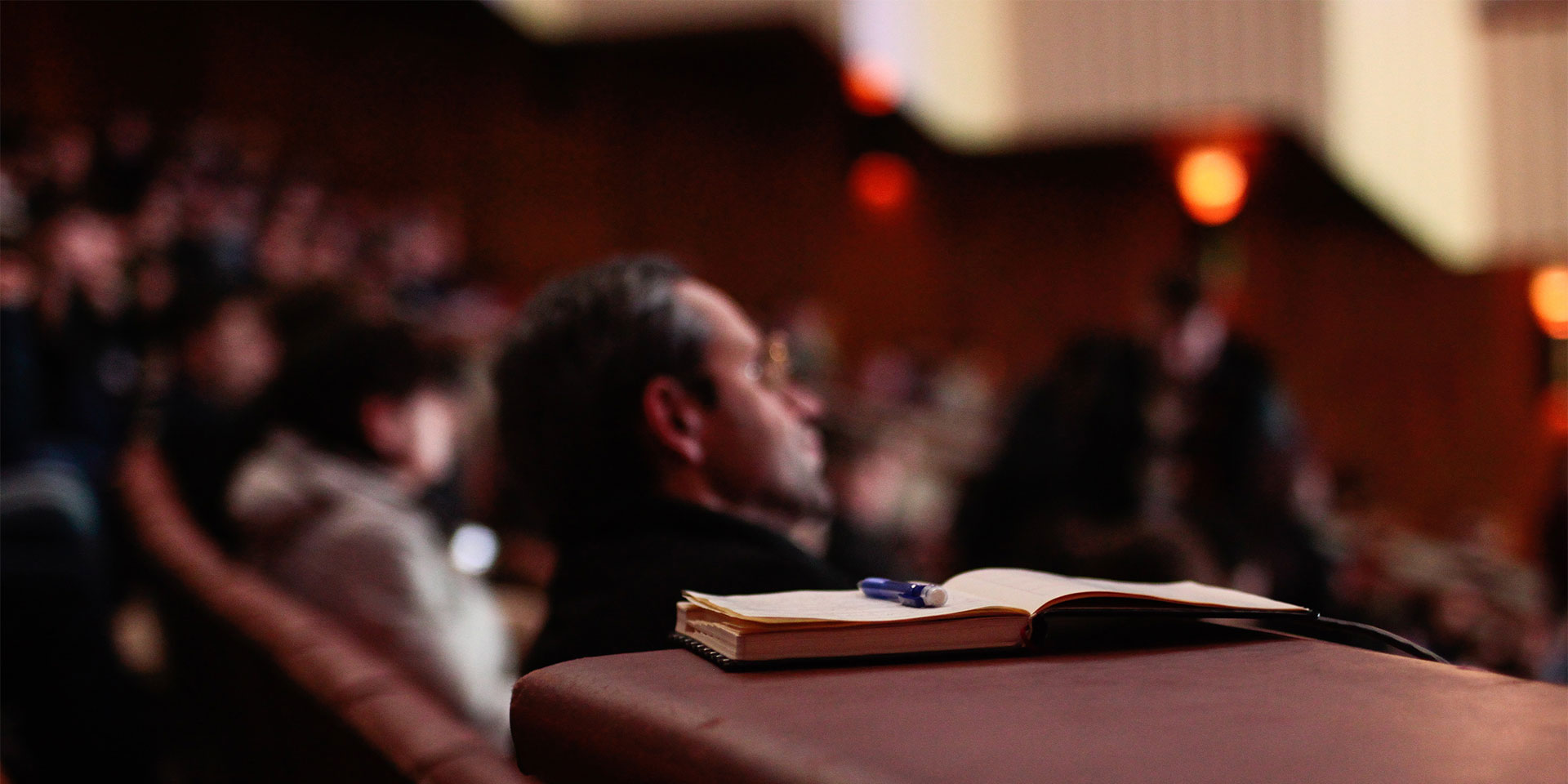The way we pray in public reveals what our secret prayers are truly like. Beyond mere words, it is our attitude and motivation that give meaning and substance to prayer.
Public prayer can uplift and inspire those who hear it, pouring forth from the fullness of a heart accustomed to seeking God. However, it can also be an experience we run from, or, when we cannot avoid it, a perfunctory recitation of empty phrases. If we are to be honest, at times, public worship becomes an opportunity to succumb to the temptation of captivating the audience with our oratorical skills.
Public prayer can be an unpleasant, even terrifying experience, as acknowledged by Christian author Kevin Harvey. In his youth, Harvey and his wife joined a nearly thousand-member church. The phone call requesting him to pray at the next church gathering caught him off guard and frightened him enough to improvise an untrue excuse on the spot: it was impossible to attend the church service, as he had to leave town.
Harvey believes a significant reason he felt so unprepared to pray was the lack of a prayer model. In the church where he grew up, people often prayed in intimidating ways—using terms he didn’t understand or found difficult to handle. Even more, as he observed when daring to open his eyes, some used notes from which they drew inspiration during prayer or read them undisturbed from beginning to end.
Why do we fear public prayer?
Perhaps, we might wish to hear more public prayers that inspire us and teach us how to pray together as a group or with our church, but the reasons we pray reluctantly in the presence of others or why we are downright paralyzed by this idea are numerous, says Pat Quinn, a former professor at University Reformed Church.
Our reluctance could stem from the fear of public speaking, a concern admitted by 25% of individuals, according to their own statements. Additionally, it might involve the challenge of striking a balance between spontaneous and structured prayer. Lastly, Quinn observes, the fear of public prayer can spring from a discouraging reality: that many Christians struggle even in private prayer to remain focused, avoid repetition, or not quickly exhaust all the topics they bring before God.
Public prayer is an act that makes us vulnerable, externalising what is hidden in our hearts. It is also an opportunity to realise that we no longer have complete control (we cannot control, for example, how long someone prays, if a person—or even ourselves—cries, or what others will think about how we pray), the author of a Christian blog says.
Sometimes, under the sway of emotion, the form and content of our prayer could be inadequate when it comes to the moment or the subject for which we pray, says Christian author Jennifer Dukes Lee, who recounts one of the mistakes made while praying for a suffering person. However, the fear of making mistakes should not be a barrier to public prayer—excessive precaution shows that prayer is focused more on people than on God, Dukes Lee says. Ultimately, more than a sequence of impeccably arranged words, prayer is a conversation with the One who values a sincere heart more than a beautifully flowing prayer.
Prayer must honour Him
Even prayers that sound beautiful (or perhaps especially such prayers) can have wrong motives, says Pastor Darrin Patrick, noting that it is sometimes easy to be good at public prayer and disastrous at individual worship. The reason, according to Patrick, is linked to the immediate reward that follows public prayer—we are complimented for how we prayed by those who do not have the same oratorical abilities, and this attention compels us to “perform.” Ultimately, “private prayer is the revealer of the true spiritual condition of the human heart.”
Anyone who prays in public will encounter the problem of wrong, selfish motives, says Pastor John Piper. Even if it happens only in the presence of two or three people, prayer is an opportune occasion for the revelation of our hypocrisy or authenticity, says the pastor, who argues that when we feel unprepared, inadequate to pray, the first condition for authentic prayer is already fulfilled. Piper speaks about how inadequate he felt to pray at an unusual funeral: a couple preparing to leave for mission work in Japan had died, along with their three children, in a car accident.
In those moments of immeasurable pain, the pastor discovered that it takes a miracle to choose words that are not entirely disproportionate to the magnitude of the tragedy. It also takes a miracle not to divert, even in the slightest measure, the public’s attention from God to the one praying to Him.
To be authentic, public prayer must be an extension of our private prayers, Christian author Darryl Burling says. He confesses that an effective method of testing the authenticity of his prayers is to honestly answer a simple question: Do I pray in public the same way I usually do in private? If there are striking differences between the two forms of prayer (if I always rush through at home and go on endlessly in public, if public prayer focuses on themes I never touch on in private prayer, or if it resorts to pretentious formulations not found in our private conversations with God), then most likely, we are trying to appear more spiritual than we actually are.
We need to pray for each other, including in public, but our prayers are authentic when they arise from a fullness of fellowship with Him, especially when no one hears us.
Principles of public prayer
It often happens that we pray most when we have the least to say, observed John Newton, the former slave trader turned priest, emphasising a key principle of effective public prayer: be concise—especially if multiple people are praying in this setting—so that listeners would wish your prayer lasted twice as long rather than spending half the time wishing it would end sooner. Moreover, the one praying in public should avoid repeating ideas and words, exhausting other worshipers by speaking too loudly or, conversely, by being barely audible.
The impact of our prayer is greatly diminished when we distort our voice until it becomes unrecognisable or when we approach God with ceremonial formulations, as if we were strangers just introduced to Him, or, on the contrary, with a familiarity bordering on irreverence, says Newton, the author of the Christian hymn “Amazing Grace.”
Incorporating biblical language into our prayers is more than a matter of vocabulary.
Our prayers (including those in private) will enrich our spiritual experience if we let them reflect not only the terminology but also the content of Scripture. To pray in this way, it is necessary to study the Bible (and the prayers recorded in its pages) and to incorporate biblical language into our own prayers—finding, for example, key phrases to use or asking the fulfilment of scriptural promises and giving thanks for the richness they offer.
It’s much more than just a matter of vocabulary, says writer Joni Eareckson Tada, emphasising that infusing the Word into our prayers means giving them power and vitality. Perhaps we too easily let ourselves be consumed by our (legitimate) needs, allowing our requests to revolve around them, but Scripture-inspired prayers keep us focused on divine priorities. Ultimately, if Jesus is the living Word, and we are encouraged to pray in His name, there’s no reason not to speak His language, the writer says.
Another principle that should guide public prayer (and help us avoid unnecessary fears or attempts to impress with sophisticated formulations) is to pray with an awareness that we are part of God’s family. “And when you pray, do not keep on babbling like pagans, for they think they will be heard because of their many words” (Matthew 6:7).
Writing about the right attitude in worship, Pastor Paul Omar Campbell emphasised that we need a sincere desire to learn how to pray, the faith that we can entrust any burden into His “everlasting arms” (Deuteronomy 33:27), honesty, seriousness, and a real need for fellowship with God and other worshipers. True prayer is also built on the willingness to align our lives with the service model offered by Jesus.
The “Amen” we utter at the end of the prayer means more than just “so be it.” What we are actually saying with this word is, “We will not interfere; we will not get in the way of having our prayers answered.” If authentic prayer is inseparable from authentic day-to-day living, then every time we lift our voice up in prayer, we promise to follow the One who surrendered to the Father’s will wherever He goes, the One whom the Bible presents as the One who is “the Amen” (Revelation 3:14).
Carmen Lăiu is an editor of Signs of the Times Romania and ST Network.



















